新概念第二册第2课课件
新概念英语第二册课PPT课件演示文稿

2)当主句的谓语动词是将来时的时候, 如: He will say, “I’ll try my best to help you.”
——>He will say that he will try his best to help me.
第二十二页,共36页。
1)时间状语:
直接引语 (间接引语)
now (then);
today (that day);
tomorrow (the next / following day ) next week (the next / following week)
yesterday (the day before)
football after school.” ——> He said that when he was a child, he usually played football after school. 5)当直接引语是客观真理或自然现象时,
第二十页,共36页。
如: Our teacher said to us, “Light travels faster than sound.” ——> Our teacher told us that light travels faster than sound. 6)当引语是谚语、格言时, 如: He said,“Practice makes perfect.” ——>He said that practice makes perfect. 7)当直接引语中有情态动词should, would, could, had
作为一名护士,你应该对病人十分耐心。
新概念第二册第2课课件 (共30张PPT)

Words and Expressions
请用以下单词或词组的正确形式填空 aunt, until, outside, ring, repeat
☺I have a nephew. He calls me _____ . ☺Don’t go ______. It’s too dangerous. ☺The ______ of the house is dirty. ☺There is a lake _____ the school. ☺On weekends, I usually sleep ____ 12 o’clock. ☺Can you ______ this sentence? I didn’t hear you. ☺The mistake is _____ again and again. ☺The door bell is _____. Go and have a look!
repeat repeat (v.) – repetition (n.) vt. / vi. / n. 重复;复述
☺ Could you repeat what you said just now? ☺ 你能复述一下你刚才说的东西吗? ☺ 延伸:what you said 你说的东西,what you did 你做的东西 ☺ what you wrote 你写的东西,what you like 你喜欢的东西 ☺ 别重复犯同样的错误,好吗? ☺ Don’t repeat the same mistakes, OK? • Will you repeat the last word? • 你能重复一下最后一句话么?
Let’s listen to the tape again and fill in the blanks
(完整版)新概念英语第二册第二课(包含课文、练习和答案)
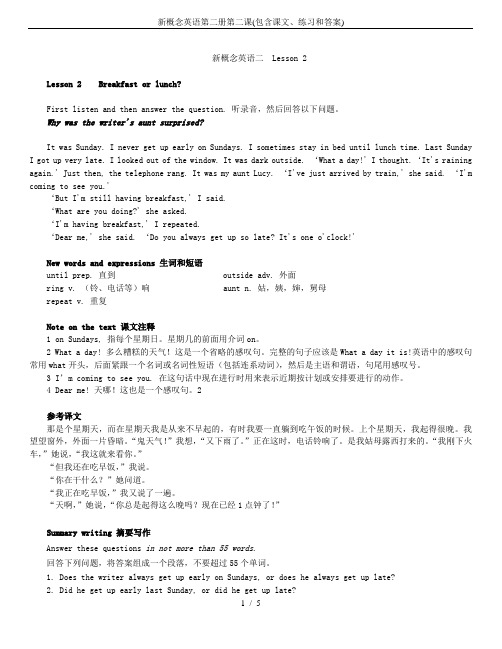
新概念英语二 Lesson 2Lesson 2 Breakfast or lunch?First listen and then answer the question. 听录音,然后回答以下问题。
Why was the writer's aunt surprised?It was Sunday. I never get up early on Sundays. I sometimes stay in bed until lunch time. Last Sunday I got up very late. I looked out of the window. It was dark outside. ‘What a day!' I thought.‘It's raining again.' Just then, the telephone rang. It was my aunt Lucy. ‘I've just arrived by train,' she said. ‘I'm coming to see you.'‘But I'm still having breakfast,' I said.‘What are you doing?' she asked.‘I'm having breakfast,' I repeated.‘Dear me,' she said. ‘Do you always get up so late? It's one o'clock!'New words and expressions 生词和短语until prep. 直到 outside adv. 外面ring v. (铃、电话等)响 aunt n. 姑,姨,婶,舅母repeat v. 重复Note on the text 课文注释1 on Sundays, 指每个星期日。
新概念英语第二册第02课
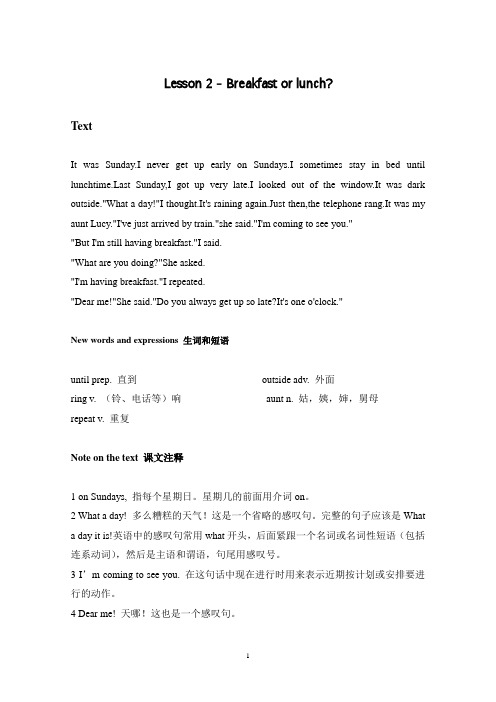
Lesson 2 - Breakfast or lunch?TextIt was Sunday.I never get up early on Sundays.I sometimes stay in bed until st Sunday,I got up very late.I looked out of the window.It was dark outside."What a day!"I thought.It's raining again.Just then,the telephone rang.It was my aunt Lucy."I've just arrived by train."she said."I'm coming to see you.""But I'm still having breakfast."I said."What are you doing?"She asked."I'm having breakfast."I repeated."Dear me!"She said."Do you always get up so late?It's one o'clock."New words and expressions 生词和短语until prep. 直到outside adv. 外面ring v. (铃、电话等)响aunt n. 姑,姨,婶,舅母repeat v. 重复Note on the text 课文注释1 on Sundays, 指每个星期日。
星期几的前面用介词on。
2 What a day! 多么糟糕的天气!这是一个省略的感叹句。
完整的句子应该是Whata day it is!英语中的感叹句常用what开头,后面紧跟一个名词或名词性短语(包括连系动词),然后是主语和谓语,句尾用感叹号。
新概念英语第二册Lesson2说课讲解
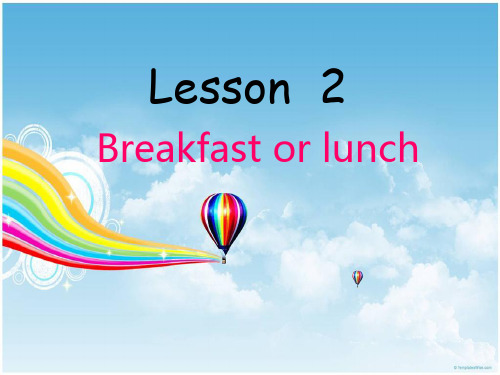
【New words 】
1 until prep. 直到 2 outside adv. 外面 3 ring v. (铃、电话等)响 4 aunt n. 姑,姨,婶,舅母 5 repeat v. 重复
★until prep. 直到
until 用 于表示动
Reading
Predict:
1.What do you think this passage will talk about after reading the title?
2.What is the main idea of the passage?
I always get up late on Sundays. And my aunt was surprised that I was still having breakfast in the afternoon last Sunday.
to wait just outside the door
3. ring (rang, rung)
动词 ①鸣,响(铃,电话等) eg. Every moring the clock ring at 6.
The telephone is ringing. ①打电话给
ring sb. eg. Tomorrow I'll ring you.
直到中午雨才停止。
I did not learn it until yesterday . 到昨天我才知道。
He did not show himself in his true colors until he gained power. 直到他掌权之后,他才露出自己的真 面目。
新概念第二册ppt课件

• 5 ---地点状语,一般在方式副词之后,时间副词之前
• 6 ---时间状语,可以放在句首或句末
• 简单陈述句一定不能少的是主语, 谓语.
• 如果问何时何地,是一个固定搭配 when and where
2021/7/31
Exercises
• Put the phrases in to correct order
2021/7/31
★ pay vt. &vi. 支付
① vt. &vi. 支付(价款等) eg. Have you paid the taxi-driver?
★ pay…for sth. 花/支付……(钱)买……
eg. I paid 50 dollars for this skirt.
2021/7/31
2021/7/31
直到
• until用于表示动作、状态等的持续,可译为“一直到……为止”或 “在……以前”。
• His father was alive until he came back. 直到他回来为止,他爸爸 都是活着的.
• His father didn‘t die until he came back. 直到他回来,他爸爸才死
adv. 外面
• ring (rang, rung) v.
(铃、电话等)响
• aunt
n. 姑,姨,婶,舅母
• repeat
v. 重复
2021/7/31
【课文讲解】
2、I never get up early on Sundays. • on Sundays: 所有的星期天,每逢星期天,与一般现在时连用,表示经常性
adj. 私人的 n. 谈话 n. 剧场,戏院 n. 座位 n. 戏 adv. 大声地 adj. 生气的 adv. 生气地 n. 注意 v. 容忍 n. 事 adv. 无礼地,粗鲁地
《新概念汉语》第二册第2课
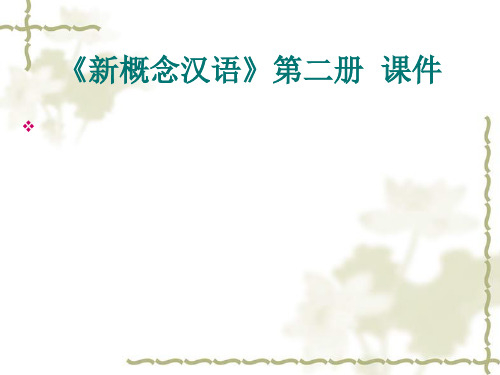
去爬山 喜欢爬山
爬楼pálóu
什么时候?
你是什么时候去西安的?
我是7月12号去西安的。 我是7月12号去的。
你是什么时候来菲律宾的?
我是9月1号来菲律宾的。 我是9月1号来的。
你是什么时候来办公室的?
你是什么时候去大使馆的? 你是什么时候来办公室的?
你是怎么去意大利的?
你是怎么来学校的? 你是怎么去故宫的? 你是怎么去颐和园的?
你是跟谁一起去爬山的?
你是跟谁一起去吃饭的?
你是在哪儿看见阿里的?
练习
1. 你去哪儿旅游了? 你去过什么地方? 中国 美国 意大驴 西班牙 银行 公司 电影院 火车站 商店 体育馆 医院 饭馆儿
《新概念汉语》第二册 课件
Lesson 2
我是今年来中国的
shēnɡcí 生词
办公室
去办公室 九点来办公室 办公室在哪儿?
意大利
意大利人 意大利语 打算去意大利旅游
咖啡馆儿
一家咖啡馆儿 我常常去咖啡馆儿喝咖啡。
一个朋友 一位朋友 男朋友 女朋友
你是什么时候去的? 你是自己去的吗? 你是怎么去的?
我的一次旅行
朋友
Gùɡōnɡ 故宫
故宫很漂亮。 故宫在北京。 故宫有
the Imperial Palace
Forbidden City
It covers an area of over 720,000 m², has more than 9,000 buildings and construction area of 150,000 square meters. It was the imperial palace of the Ming and Qing dynasties, is the existing China's largest and most complete ancient buildings. It was first built in 1406 and finished in 1420.
新概念英语第二册第二课(包含课文、练习及答案)
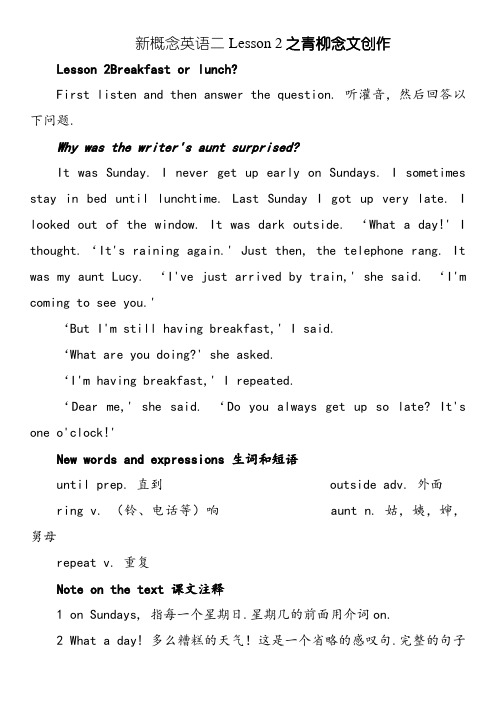
新概念英语二Lesson 2之青柳念文创作Lesson 2Breakfast or lunch?First listen and then answer the question. 听灌音,然后回答以下问题.Why was the writer's aunt surprised?It was Sunday. I never get up early on Sundays. I sometimes stay in bed until lunchtime. Last Sunday I got up very late. I looked out of the window. It was dark outside. ‘What a day!' I thought.‘It's raining again.' Just then, the telephone rang. It was my aunt Lucy. ‘I've just arrived by train,' she said. ‘I'm coming to see you.'‘But I'm still having breakfast,' I said.‘What are you doing?' she asked.‘I'm having breakfast,' I repeated.‘Dear me,' she said. ‘Do you always get up so late? It's one o'clock!'New words and expressions 生词和短语until prep. 直到 outside adv. 外面ring v. (铃、电话等)响 aunt n. 姑,姨,婶,舅母repeat v. 重复Note on the text 课文注释1 on Sundays, 指每一个星期日.星期几的前面用介词on.2 What a day! 多么糟糕的天气!这是一个省略的感叹句.完整的句子应该是What a day it is!英语中的感叹句常常使用what开首,后面紧跟一个名词或名词性短语(包含连络动词),然后是主语和谓语,句尾用感叹号.3 I’m coming to see you. 在这句话中现在停止时用来暗示近期按计划或安插要停止的动作.4 Dear me! 天哪!这也是一个感叹句.2参考译文那是个星期天,而在星期天我是从来不早起的,有时我要一直躺到吃午饭的时候.上个星期天,我起得很晚.我望望窗外,外面一片昏暗.“鬼天气!”我想,“又下雨了.”正在这时,电话铃响了.是我姑母露西打来的.“我刚下火车,”她说,“我这就来看你.”“但我还在吃早饭,”我说.“你在干什么?”她问道.“我正在吃早饭,”我又说了一遍.“天啊,”她说,“你总是起得这么晚吗?现在已经1点钟了!”Summary writing 摘要写作Answer these questions in not more than 55 words.回答下列问题,将答案组成一个段落,不要超出55个单词.1. Does the writer always get up early on Sundays, or does he always get up late?2. Did he get up early last Sunday, or did he get up late?3. Who telephoned then?4. Had she arrived by train, or had she come on foot?5. Was she coming to see him or not?6. Did he say,‘I’m still having breakfast’, or did he say,‘I am still in bed’?7. Was his aunt very surprised or not ?8. What was the time?_____________________________________________________________ _____________________________________________________________ _____________________________________________________________ _____________________________________________________________ _____________________________________________________________ _____________________________________________________________ _____________________________________________________________ _____________________________________________________________ _____________________________________________________________ _______________Key Structures关键句型Now,Often and Always 暗示现在和常常发生的动作Study these statements and questions from the passage.注意以下摘自本课的陈述句和疑问句.Now Often and AlwaysIt’s raining. I never get up early on Sunday.I’m coming to see you. I sometimes stay in bed until lunch time.I’m still having breakfast. Do you alwaysget up so late?What are you doing?Here are some more sentences.请看其他例句:He is still sleeping. He rarely gets up before 10 o’clock.We are enjoy our lunch. We frequently have lunch at this restaurant.I am reading in bed. Do you ever read in bed?Exercises 操练A. Write out these two paragraphs again. Give the right form of the words in brackets.用正确的动词时态填空.1. I am looking out of my window. I can see some children in the street. The children _________ (play) football. They always _________(play) football in the street. Now a little boy _________ (kick) the ball. Another boy _________(run) after him but he can not catch him.2. I carried my bags into the hall.‘What _____you _____(do)’my landlady asked.‘I _______ (leave), Mrs Lynch,’I answered.‘Why _____you _____ (leave)’she asked. ‘You have been here only a week.’‘A week too long, Mrs Lynch,’I said.‘There are too many rules in this house. My friends never _________ (come) to visitme. Dinner is always at seven o’clock, so I frequently_______ (go) to bed hungry. You don’t like noise, so I rarely_________ (listen) to the radio. The heating doesn’t work, so I always __________ (feel) cold. This is a terrible place for a man like me. Gookbye, Mrs Lynch.’B. Note the position of the words in italics in these sentences.注意以下句子中用斜体印出的词的位置:My friends never come to visit me.I frequently go to bed hungry.I rarely listen to the radio.I always feel cold.I never get up early on Sundays.I sometimes stay in bed until lunchtime.Write these sentences again. Put the words in brackets in the right place.改写下列句子,把句尾括号中的词放在合适的位置.1. She answers my letters. (rarely)2. We work after six o’clock. (never)3. The shops close on Saturday afternoon. (always)4. Do you go to work by car? (always)5. Our teacher collects our copybooks. (frequently)6. We spend our holidays abroad. (sometimes)7. I buy gramophone records. (often)8. Do you buy gramophone records? (ever)Special difficulties难点在英语中往往可以用what引导的感叹句来暗示诧异、愤怒、赞赏、喜悦等感情.在感叹句仲主谓语采取正常语序.如课文中的例句“What a day!”注意以下例句:Instead of saying: We can say:除了这种表述方法外:还可以说:It is a terrible day! What a terrible day!This is a beautiful picture! What a beautiful picture! Or: What a beautiful picture this is.Exercise 操练Write these sentences again. Each sentence must begin with What.改写下列句子,用What来引导下列感叹句.1. This is a wonderful garden!2. This is a surprise!3. He is causing a lot of trouble!4. They are wonderful actors!5. She is a hard-working woman!6. It is a tall building!7. It’s a terrible film!8. You are a clever boy!9. She is a pretty girl!10. He is a strange fellow!Supplementary Written ExercisesCOMPREHENSION 懂得1. When Aunt Lucy telephoned _________ .(a) the writer was asleep. (b) the writer was still in bed.(c) the writer had already got up. (d) the writer was having lunch.2. Aunt Lucy was surprised because_________.(a) the writer was having lunch. (b) it was one o’clock.(c) it was late. (d)the writer was having breakfast at lunch time.STRUCTURE 句型3. He sometimes _________ in bed until lunch time.(a) stay (b) is staying (c) stays (d) staying4. He stayed in bed until lunch time. He went _________ bed late last night.(a) in (b) into (c) to (d)at5. He doesn’t get up early on Sundays. He gets up ________.(a) late (b) lately (c) slowly (d) hardly6. ______ did aunt Lucy come? By train.(a) When (b) How (c) Why (d) Wherehe writer can’t see aunt Lucy________. He’s having breakfsat.(a) still (b) now (c) often (d) alwaysVOCABULARY 词汇8. He _________ out of the window and saw that it was raining.(a) looked (b) saw (c) remarked (d) watched9. Jast then, the telephone rang. It rang _________.(a) at once (b) immediately (c) again (d) at that moment10. She was his aunt, so he was her __________.(a) son (b) grandson (c) nephew (d) niece11. Breakfast is the first_________ of the day.(a) food (b) dinner (c) lunch (d) meal12. Aunt Lucy said,‘Dear me’because she was_________.(a) angry (b) surprised (c) tired (d) pleasedSENTENCE STRUCTURE 句子布局Rewrite this sentence, then check your answer against the text:改写下列句子,然后对照课文核对你的答案.I arrived by train a moment ago.I’ve_________________________________________________________________ ____。
新概念英语第二册第2课 完整

from time to time 有时候 • almost never;hardly ever;rarely;
scarcely ever;seldom 很少 • not…ever;never 从不
not until...
She didn't go to bed until eleven o'clock. 她直到十一点才上床睡觉。
They didn't find her until the next day. 他们直到第二天才找到她。
• outside /'aut'saɪd/ n. 外面,外部,外观 备注:inside 里边 outsider 局外人
• aunt /a:nt/ n. 姑母,姨母,阿姨,伯母,舅母,舅妈 uncle 叔叔,伯伯,伯父
• repeat /ri'pi:t/ n. 重复 v.重复
He repeated several times that he was busy. Today's lecture was an exact repeat of yesterday's.
Listen to the story and keep these questions in mind.
• What was the weather like last Sunday? • Who was coming to see the writer? • Why was the writer's aunt surprised?
新概念英语第二册第2课

2. Aunt Lucy was surprised because_______
A the writer was having lunch B it was one o’clock C the writer was having breakfast at lunchtime
D it was late
2. Just then, the telephone rang. It rang_______. A at onnt
3. She was his aunt, so he was her_____. A son B grandson C nephew D niece
3. Why was the writer's aunt surprised? Because it was one o'clock, but the writer was still having the breakfast.
Notes on the text
❖ on Sundays—指每个星期日。 ❖ What a day!---此句为感叹句。完整句子为What a day it is! ❖ by train ----介词短语,可以和动词短语take the train进行互换。 ❖ I’m coming to see you.—现在进行时表将来,用现在进行时
Read and answer the questions.
1. What was the weahter like last Sunday? It was bad. It was dark outside. And it was raining.
2. Who was coming to see the writer? His aunt, Lucy.
新概念英语第二册Lesson1-Lesson2课件

Language points
1. private adj. 私人的 private letter/house ;private school:私立学校
private life 私生活
private space 私人空间
public
公共的,公开的
pubic letter 公开信
public place 公共场所
10. In the end, I could not bear it. bear v. 容忍 eg. I can't bear it. 我受不了了。 stand=put up with=bear 都可以表 示容忍 bear n. 熊 a big black bear 一头大黑熊
in the end:最后,终于 finally; at last
简单陈述句:了解其功能;理解其语 序及组成部分。 The policeman arrested the thief . 主语 谓语 宾语
The thief arrested the policeman.
主语 谓语 宾语
主语;谓语;宾语;方式状语;地点状语;时间状语 主语;谓语;表语
6
1主语
Which? What?
Listen and read the text to find out the answers to the following questions
• • • • • •
1 What day was it? 2. When did you get up last Sunday? 3. What was it like outside? 4. Did you think it was a nice day? 5. What happened just then? 6. Who was on the phone?
新概念英语第二册第2课ppt课件
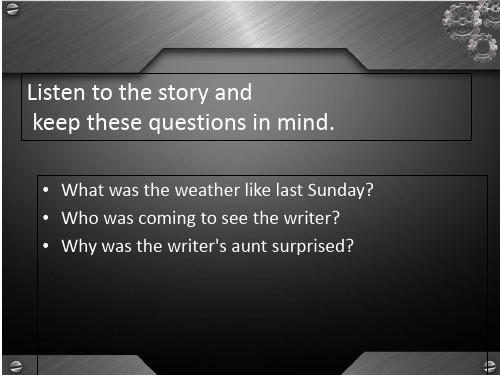
病原体侵入机体,消弱机体防御机能 ,破坏 机体内 环境的 相对稳 定性, 且在一 定部位 生长繁 殖,引 起不同 程度的 病理生 理过程
•
‘But I'm still having breakfast,' I said.
•
‘What are you doing?' she asked.
•
‘I'm having breakfast,' I repeated.
病原体侵入机体,消弱机体防御机能 ,破坏 机体内 环境的 相对稳 定性, 且在一 定部位 生长繁 殖,引 起不同 程度的 病理生 理过程
never<seldom<sometimes< often<usually<always
• I never went to the class in high school time. • I seldom read books in my spare time. • Sometimes she watches TV at home • We often meet at the coffee shop. • Usually Mr. Johnson is a normal man. • Mr.Johnson always guides us to be a good man.
新概念英语第二册Lesson2完整课件
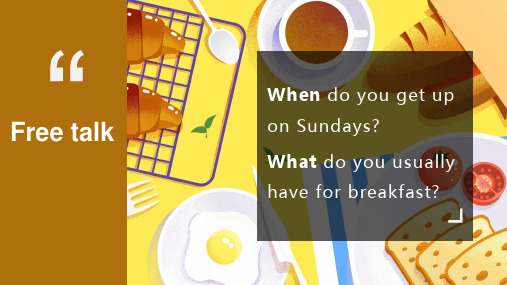
③ n. (打)电话 give sb. a ring 记得打电话给我! Remember to give me a ring.
④ n. 戒指 wedding ring
aunt n. 姑,姨,婶,舅妈 uncle n.叔叔,舅舅,姑父 他们的孩子:cousin[ˈkʌzn] 堂兄妹(不分男女) cousin的孩子:
'Do you always get up so late? It's one o'clock!'
I'm coming to see you. 用 come 的现在进行时态 be coming 表示一般将来,表示 近期按计划或安排要进行的动作。 同样用法的动词有: go,come,leave,arrive… 你马上就要离开吗? Are you leaving at once? 明天他就到了。 He is arriving tomorrow.
repeat v. 重复 不要重复! Don't repeat!
他们正在重复那个有趣的游戏。 They are repeating that interesting game.
Why was the writer's aunt surprised?
It was Sunday. I never get up early on Sundays . I sometimes stay in bed until lunchtime. Last Sunday I got up very late. I looked out of the window. It was dark outside . 'What a day!' I thought. 'It's raining again.' Just then, the telephone rang . It was my aunt Lucy. 'I've just arrived by train,' she saidSu.nd'aI'yms coming to see you.'
新概念英语第二册Lesson2课件

look into 1. 向...里看
look into the box 2. 调查,分析
向盒子里面看
The police are looking into the case. 警察正在调查这个案件。
Look out ! 小心,当心
Look out ! The car nearly knocked you over.
2021/3/11
15
How +形容词 + 主语 + 谓语 How careless she is!
当 What +(a/an)+形容词+人称代词(+be动词时, 两者完全相等 What an interesting story it is! = How interesting the story is! What a clever girl she is! = How clever she is!
11学习交流ppt时间范围较广表示某年某季节某月某周某一天的某段时间year在一年中may在五月march7thmondayafternoon在周一下午march7th2013twooclock在两点moment在这一刻注意
Lesson2 Breakfast or lunch?
a story about a man who doesn't like getting up early on Sundays.
6
eg: He___until it stopped raining. A.waited B.didn't wait A.leave. B.left C.didn't leave
• We stayed until the rain stopped. • 我们一直等到雨停为止。 • We didn’t start until the rain stopped. • 直到雨停了我们才出发。 • 她六点才能来。
新概念第二册第2课

Language points 课文语言点 1、It was Sunday.
• it 指时间、天气、温度或距离,it 被称为“虚主语” (empty subject)。作为第三人称单数的中性代 词,it可以指一件东西、一件事或用来指是什么人: • It is a lovely baby. • It is twelve o'clock. • It's hot outside. • 从公司到我家大概有5公里。 • It is about 5 kilometers from the company to my home.
repeat v. 重复 ① vt. 重复 Will you repeat the last word?你能重复最后一个词吗? They are repeating that wonderful play. ② vi. 重做,重说 Please repeat after me.请跟我读。 Don’t repeat.
Lesson 2
Breakfast or lunch?
Key words and Expressions
until prep. 直到 I sometimes stay in bed until lunchtime.
我有时一直躺到吃午饭的时候。ed in bed until he woke me up. not …until
(3)表客观真理,格言警句或事实 e.g. The earth moves around the sun. The sun rises in the east and sets in the west.
• • • • • • • • • •
一般现在时: 表述频度的副词 never、seldom、sometimes、often、usually、always I'm never late for appointments. Sometimes he tells us jokes. We often meet at the coffee shop. She is always nice and friendly to people. I seldom watch TV. 频率副词往往放在句子中间, 实义动词前, 非实义动词后 疑问句中副词往往放在主语后面.
- 1、下载文档前请自行甄别文档内容的完整性,平台不提供额外的编辑、内容补充、找答案等附加服务。
- 2、"仅部分预览"的文档,不可在线预览部分如存在完整性等问题,可反馈申请退款(可完整预览的文档不适用该条件!)。
- 3、如文档侵犯您的权益,请联系客服反馈,我们会尽快为您处理(人工客服工作时间:9:00-18:30)。
中考链接: 2.The earthquake which happened in Yushu __14th B April 2010 was a big disaster. A.at B. on C. in D. to 答案 3.Some volunteers(志愿者) from Beijing arrived in Shanghai ______ April to work for the World Expo. C A. on B. at C. in D. to 答案:
Breakfast is the most important in the three meals. The early bird catches the worm.
短语复习
• 去看戏
go to the theatre
• 变得很生气 get very angry • 注意 • 最后
pay attention to in the end
Listen and answer the question
Why was the writer’s aunt surprise?
Because the writer got up so late .
Watch and repeat
1.I never get up early on Sundays.
时和一般发过去时连用。 例如:Sometimes he goes to school by bus, sometimes by bike. 3)sometime 是副词,意为“在某个不确定的时间、时 候”“某时”,。
• 2)some times 是名词词组,意为“几次,几倍” 例如:I met him some times in the street last month. • 4)some time 是名词词组,意为“一段时间”,作时间 状语;也可以用作副词词组,用来指一个为肯定的时刻。 • 例如:I’ll stay here for some time. They’ll visit China some time next year
aunt repeat
//
// //
//
1. until
prep.
直到
until 直到…时 Lucy studied until 11 o’clock yesterday.
not · · · until ,直到…才 He didn’t get up until lunch time.
1) never 从来不 I don't like her. =I never like her. 2)介词on 在时间前的用法: 具体到某一天on on Sunday on Monday When is your birthday? 具体到某一天的上中下午 用on on Monday afternoons, on Wednesday mornings on Sundays 不是指一个星期天,而是每一个星期天 例如:on Saturdays, on Mondays
• 翻译句子
• 上星期,我去看戏。
• Last week ,I went to the theatre.
• 戏很有意思。
• The play is very interesting.
• 我听不到演员再说什么,我变得非常生气。
• I could not hear the actors , I got very angry.
• 不管你的事。
• It’s none of your business.
• 我生气地看着那一男一女,他们却毫不理会。
• I looked at the man and the woman angrily, but they didn’t pay any attention.
• 到最后,我不能忍不住了。
A. stay B. stayed C. didn’t stay
C 4.I ______until 12 o'clock.
A. gets up B. get up C. didn’t get up 把until 作为时间终止线 从句的时间终点之前,这个动作做了还是没做,做了-肯定;没做-否定. 中考链接: B my mother came back late last night. 1..I didn’t go to bed ____
until
// prep.直到
outside / / 外面 adv.Fra bibliotekring
//
v.(铃,电话等)响
//rung
rang //
aunt // n. 姑,姨,婶,舅母 repeat / v. / 重复
until outside ring
习题链接:
1.he ______ until it stopped raining. A A. waited B. didn't wait C. waiting 2. he ______ until it stopped raining. C A.leave B. left C. didn‘t leave B 3.I ______ in bed until twelve o'clock.
• 直到他回来,他爸爸才死. • His father was alive(有生命的,活着的) until he came back. • 他爸爸都是活着的,直到他回来为止.
• He didn’t get up until lunch time. • I didn’t go to bed until my mother came back late last night. • I stayed in bed until twelve o'clock. • Lucy studied until 11 o’clock yesterday.
Tomorrow I'll ring you.
n. 环,戒指; ring finger 无名指, thumb, index finger, long finger, small finger
• • • • •
3. aunt n.姑,姨,婶,舅妈 (所有长一辈的女性都用这个称呼)与此相同, 男性则是 uncle;叔叔 cousin 堂兄妹(不分男女) nephew 外甥, niece 外甥女
反义词 inside
例如: It is cold outside. It’s dark outside . 他正在外面等我 waiting outside He is _______(wait)for me_______.
中考链接:
---Can you see some people are waiting ____ C the library. ---Yes. They are standing in a queue in front of its gate. A.around B. inside C. outside D. / 答案
• 4. repeat v.重复 • repeat 不与again 连用。因其本身就有“重复”的含义。 • 例如:Please do not repeat what I’ve just told you.
根据首字母及句意填空。
• I often g_____ et up early in every morning. • I didn’t hear clearly just now.Can you epeat r______what you said. • The clock didn’t r ing _____ this morning. • She is the wife of your father’s brother, so she is you’re aunt _____. utside, but it’s warm inside. • It’s cold o_____
3. ring v.(铃、电话等)响(刺耳的) ring// , rang/r/, rung/r/ v. ⑴ The telephone is ringing.
At 8o’clock this morning the telephone ______ ⑵ 给某人打电话: ring sb.
1.Do you get up early every day? 2.When do you usually get up / have breakfast? 3. What do you usually have for breakfast?
Remember in your heart 请记住哦!
• In the end ,I could not bear it.
• grammar
• 选正确单词的正确形式填空。
• • • • • • • •
interesting/ interested interesting The play was very ________. I’ve always been ____________ interested in English. I found the film very ________. interesting listen / hear He ________ listened carefully to the teacher’s every word. hear the Chinese teacher’s word. I couldn’t ______ If you ______hard, you can ____the sound(声音) of hear listen the wind. • -Mary’s left he city. heard • -Yes, I’ve _______.
Tom won’t go out to play football until he finishes his homework.
